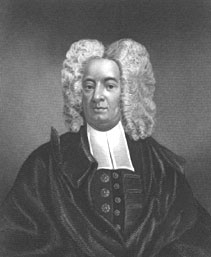Three Sizes Too Small

In the year of Our Lord, 1682,
To ye aged and beloved Mr. John Higginson:
There is now a ship at sea called "The Welcome", which has on board 100 or more heretics called Quakers, with Penn, the chief scamp at the head. The General Court has given sacred orders to Master Huscroft of the Porpoise to waylay "The Welcome" slyly, and make captive the said Penn and his ungodly crew, so that the Lord may be glorified and not mocked with the heathen worship of these people. Much spoil can be made for selling the whole lot to Barbados, where the slaves fetch good prices in rum and suger, and we shall make great good for the Lord's ministers and people.
Yours in the bowels of Christ,
Cotton Mather
---
At sunrise, on June 5, 1637, Colonists and Indian allies, attacked a Pequot village near West Mystic, Connecticut, where they burned 600-700 Native Americans alive. (When researching this yesterday, I was horrified to discover that one of my ancestors, a volunteer in the Colonial Army, participated in this atrocity.)
Cotton Mather wrote that the colonists believed this to be a "sweet sacrifice. . . and gave praise thereof to God." Later that month, the colonists captured most of the remaining Pequots and sold them into slavery in Bermuda.
The author, Nathaniel Hawthorne, referred to Mather as an "old hearted pedantic bigot."
-----
O.K. I'm sure Cotton Mather had many good qualities that I'm failing to mention here. I realize that we have the benefit of history to review his troubling actions. Some folks even quote him as a hero.
Nevertheless, it seems to me that Rev. Cotton's head was a size too big, and his heart was about three sizes too small.

Hi Mark:
ReplyDeleteI wasn't holding him up as a hero when I posted that. I just thought his quote was a good one: "The office of the Christian ministry, rightly understood, is the most honourable, and important, that any man in the whole world can ever attain..."
I must confess that I was unaware of a lot of the past history of his, that you mentioned, and I will try to study him further before I post anything from him again.
On the issue of slavery though, it's difficult to find pastors in that era who didn't have that particular (and unfortunate) blindspot. It's like the polygamy blindspot that many of our old testament writers seemed to have.
Anyway, thanks for the FYI, that's valuable to know.
--Jim
Oops. Sorry about that, Jim. You didn't say he was a hero, and it was a good quote.
ReplyDeleteOne other thing -- regarding slavery.
ReplyDeleteWhitefield had a blind spot concerning it, but Wesley didn't.
The original Wesleyan Methodists were abolitionists and they paid a dear price.
Good for Wesley, and shame on Whitefield. It's a sad chapter in history, especially for many in my heritage. I'm happy to say that there were some bright spots however. Charles Spurgeon was so outspoken against slavery in the mid 19th century, that the US-south had banned his sermons for a time. Also regarding the American Indians, David Brainerd and Jonathan Edwards were very active among them. I think the indians that they ministered to were later moved by the government to Green Bay WI, and became our Oneida tribe. Anyway, nice talking to you, and I also agree that Cotton Mather had a permanent bad hair day:-) May God bless your efforts in northern Wisconsin. I live in Milwaukee, and have a sister who lives a few miles from your church. Take care.
ReplyDelete--Jim
Bad hair day! lol
ReplyDeleteI think I'm going to get my hair done like that!
I still don't know if it competes with William Wilburforce's hair. That man's hair was downright "pretty" :-)
ReplyDelete